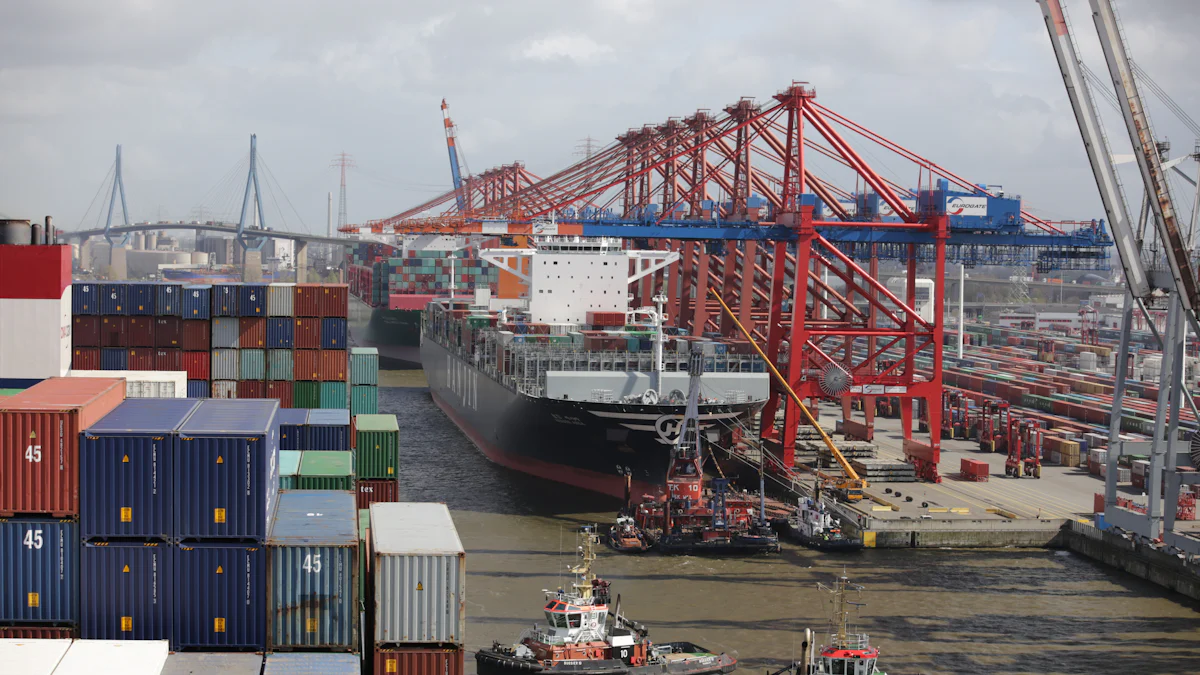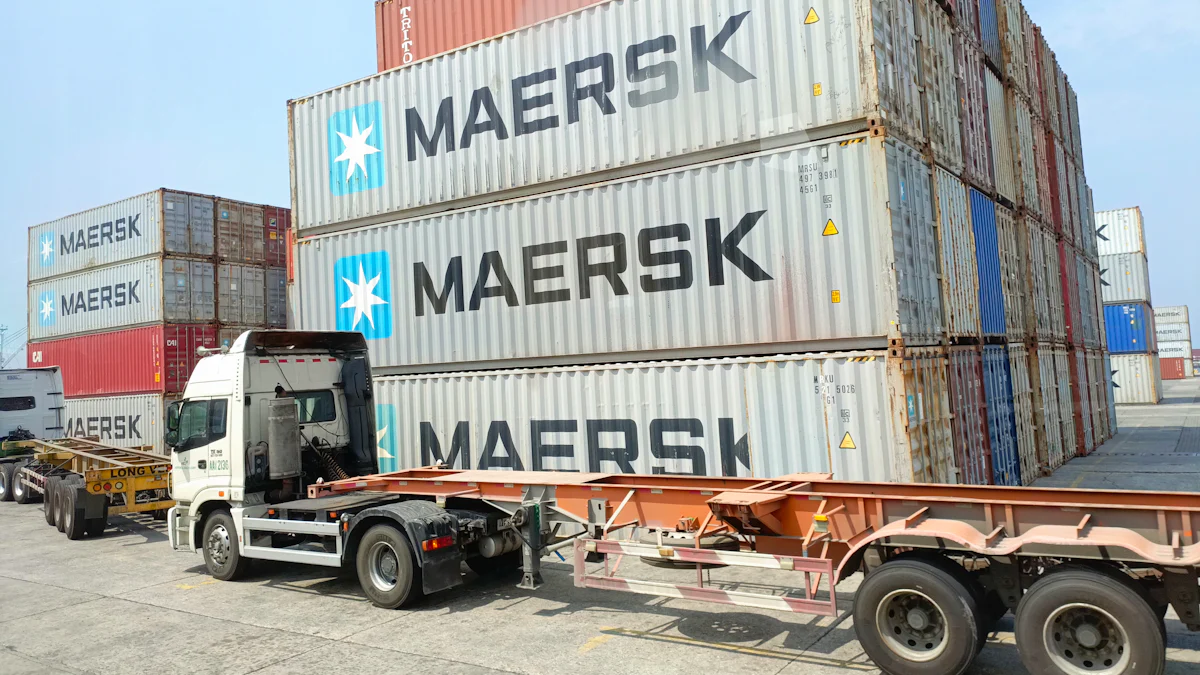Understanding Freight Forwarding Services in Global Logistics Networks

Freight forwarding services play a crucial role in the global logistics network. These services facilitate the smooth movement of goods across international borders. The global freight forwarding industry is valued at approximately $300 billion. This significant market size highlights the importance of freight forwarding in today's interconnected world. Technological advancements continue to reshape logistics, driving efficiency and innovation. Digital transformation enhances the capabilities of freight forwarders, enabling them to meet evolving consumer demands and economic shifts.
Defining Freight Forwarding Services
What is Freight Forwarding?
Freight forwarding services manage the transportation of goods from one location to another. These services simplify complex logistics processes involved in international trade. Freight forwarding services act as intermediaries between shippers and transportation services.
Key Functions
Freight forwarding services perform several essential functions. These include negotiating freight rates, arranging cargo space, and handling customs documentation. Freight forwarders also coordinate local transporters for safe and timely delivery. A logistics expert emphasizes the importance of these tasks in ensuring efficient supply chain management.
Types of Freight Forwarders
Different types of freight forwarders offer specialized services. Some focus on air freight, while others handle ocean or rail freight. Each type provides unique solutions tailored to specific shipping needs. The choice depends on factors like cost, speed, and cargo requirements.
Role in Global Logistics
Freight forwarding services play a vital role in global logistics networks. These services enhance the efficiency of supply chains by coordinating various transportation modes.
Coordination and Management
Freight forwarders excel in coordination and management. They organize every step of the transportation process, from cargo consolidation to delivery. This orchestration ensures seamless movement of goods across borders. Expert testimony highlights the critical role of freight forwarders in optimizing logistics operations.
Integration with Supply Chains
Integration with supply chains is another key aspect of freight forwarding services. These services connect shippers with a network of transportation and distribution channels. This integration allows businesses to focus on core operations while freight forwarders handle logistics complexities.
Reasons to Choose a Freight Forwarder
Freight forwarding services Freight forwarding services offer numerous advantages for businesses involved in international trade. These services provide both cost savings and convenience, making them an essential component of global logistics networks.
Cost Savings
Freight forwarding services deliver significant cost savings through strategic approaches.
Economies of Scale
Freight forwarders leverage economies of scale to reduce transportation costs. By consolidating shipments from multiple clients, freight forwarders negotiate better rates with carriers. This bulk shipping approach lowers expenses for individual businesses. The ability to secure favorable terms results in substantial savings on logistics expenditures.
Negotiation Power
Freight forwarding services possess strong negotiation power due to their extensive industry connections. Freight forwarders maintain relationships with various carriers and service providers. These connections enable freight forwarders to obtain competitive rates and space allocations. Businesses benefit from reduced shipping costs and improved service quality.
Convenience and Expertise
Freight forwarding services offer unmatched convenience and expertise, simplifying complex logistics processes.
Handling Complex Documentation
Freight forwarders excel in managing complex documentation required for international shipping. These services handle customs paperwork, regulatory compliance, and other necessary documents. This expertise ensures smooth and timely clearance of goods at borders. Businesses avoid delays and penalties associated with improper documentation.
Risk Management
Freight forwarding services provide effective risk management solutions. Freight forwarders identify potential risks in the supply chain and implement strategies to mitigate them. These services offer insurance options to protect against loss or damage during transit. Businesses gain peace of mind knowing that their shipments are safeguarded.
Freight forwarding services enhance operational efficiency through technology adoption. Digital tools streamline processes and provide real-time updates. Improved customer experience and streamlined operations result from these technological advancements. Businesses choosing freight forwarding services benefit from both cost savings and expert handling of logistics complexities.
Enhancing Efficiency through Digitalization

Automation in Freight Forwarding
Freight forwarding services increasingly rely on automation to enhance operational efficiency. Automation streamlines operations by reducing manual tasks. Automated systems manage scheduling, tracking, and documentation. These systems ensure faster processing and minimize delays. Freight forwarding services benefit from consistent and accurate operations.
Reducing human error is another advantage of automation in freight forwarding services. Automated processes eliminate the risk of mistakes common in manual handling. Freight forwarding services use technology to ensure precise data entry and management. This precision enhances reliability and builds trust with clients. Businesses experience fewer disruptions and improved service quality.
Digital Tools and Platforms
Freight forwarding services leverage digital tools and platforms for better performance. Real-time tracking provides visibility into the movement of goods. Clients access up-to-date information on shipment status. This transparency improves communication and customer satisfaction. Freight forwarding services gain a competitive edge through enhanced tracking capabilities.
Data analytics play a crucial role in modern freight forwarding services. Analytics tools process vast amounts of data to identify trends and patterns. These insights help optimize routes and reduce costs. Freight forwarding services use data to make informed decisions and improve efficiency. Businesses benefit from data-driven strategies that enhance logistics operations.
Scientific Research Findings:
Digital Freight Forwarding Crucial for Competitiveness: Digital freight forwarding offers better tracking, communication, and visibility. Businesses that fail to digitize risk losing customers.
Digitization of Freight Forwarding Procedures: Digitization is essential for a better future in global freight forwarding.
Technology-Driven Customer Service Platforms in Freight Forwarding: Technology-driven platforms provide self-service options and instant support, improving customer experience.
Proactive and Efficient Customer Service through Digital Logistics: Digital logistics streamlines transportation, enhancing customer satisfaction.
Freight forwarding services embrace digitalization to remain competitive. Automation and digital tools transform logistics processes. Businesses gain from improved efficiency and customer experiences. The integration of technology ensures freight forwarding services meet evolving demands.
Operational Efficiencies in Freight Forwarding
Optimizing Routes and Schedules
Use of Technology
Freight forwarding services utilize advanced technology to optimize routes and schedules. Digital platforms streamline processes by providing real-time data and analytics. This technology aids in planning and ensures efficient route selection. Automated systems track shipments accurately, reducing delays and enhancing reliability. The integration of IoT devices further improves supply chain visibility.
Collaboration with Carriers
Collaboration with carriers plays a crucial role in optimizing freight operations. Freight forwarders maintain strong relationships with various carriers. These partnerships enable the negotiation of favorable terms and space allocations. Coordinated efforts ensure timely delivery and cost-effective solutions. The collaboration enhances service quality and customer satisfaction.
Inventory and Warehouse Management
Just-in-Time Delivery
Just-in-Time (JIT) delivery is a key strategy in inventory management. Freight forwarders implement JIT to minimize inventory levels and reduce costs. This approach ensures products arrive exactly when needed, avoiding stock-outs. Real-time information on product availability supports accurate shipments. The strategy optimizes supply chain operations and drives efficiency.
Cost-effective Storage Solutions
Cost-effective storage solutions are essential for efficient logistics. Freight forwarders offer innovative warehousing options to meet diverse needs. Digital systems manage inventory in real time, reducing excess stock. Automated order information flow streamlines storage and retrieval processes. These solutions enhance operational functions and improve overall efficiency.
The Future of Freight Forwarding

Embracing Digital Transformation
Innovations on the Horizon
Freight forwarding services are embracing digital transformation. Companies are implementing advanced logistics solutions. These solutions provide complete visibility into supply chains. Digital platforms simplify processes and enhance customer engagement. Freight forwarders are leveraging technology to offer innovative services. Automation and real-time tracking are becoming standard practices. These innovations improve efficiency and reduce operational costs. Companies adopting digital tools gain a competitive advantage in the market.
Challenges and Opportunities
Digital transformation presents both challenges and opportunities. Freight forwarders face obstacles in integrating new technologies. Training employees and upgrading infrastructure require significant investment. However, these challenges also present opportunities for growth. Companies that successfully implement digital solutions see improvements. Enhanced customer satisfaction and streamlined operations result from digital adoption. Businesses must navigate these challenges to remain competitive. The future of freight forwarding depends on embracing digital transformation.
Sustainability in Logistics
Eco-friendly Practices
Sustainability is a growing focus in logistics. Companies are implementing eco-friendly practices to protect the environment. Freight forwarders are adopting green technologies and methods. Electric vehicles and energy-efficient warehouses reduce carbon footprints. Sustainable packaging and waste reduction initiatives are gaining traction. These practices align with global efforts to combat climate change. Logistics companies are leading the way in environmental responsibility.
Regulatory Compliance
Regulatory compliance is crucial in sustainable logistics. Governments are imposing stricter environmental regulations. Freight forwarders must adhere to these standards to operate legally. Compliance ensures that companies meet emissions targets and safety requirements. Logistics providers are investing in technologies to monitor compliance. Real-time data and analytics help track environmental impact. Meeting regulatory standards enhances a company's reputation and credibility. Sustainability and compliance go hand in hand in the logistics industry.
Freight forwarding services offer significant benefits in global logistics. These services enhance supply chain efficiency and cost-effectiveness. Digital transformation plays a crucial role in modernizing freight forwarding. Technology simplifies processes and improves operational efficiency. The future of logistics depends on embracing digital tools. Businesses should adopt these innovations to remain competitive. Digital logistics enhances customer service and transparency. Companies must leverage technology for better service delivery. Embracing new technologies ensures success in the evolving logistics landscape.
See Also
Revealing the Latest in Sea Freight Logistics for 2024
Exploring Top Global Logistics Companies: The Definitive Guide
Analyzing the Future of Less Than Truckload Freight
Addressing Globalized World Challenges in Supply Chain Growth
Navigating the Future of Logistics Through Digital Innovation
